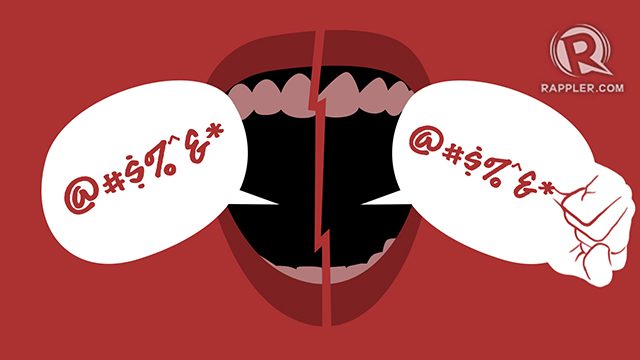SUMMARY
This is AI generated summarization, which may have errors. For context, always refer to the full article.

Millennials are enamored with filters. Some of us slap it on photos like crazy. But when it comes to words, we don’t hold back. No filter. Some say they resort to cursing because only through this can they truly express their deepest frustrations.
We are constantly encouraged to take part in civic discussions offline and online because our voices can make a difference and it matters. This is true. But at the same time, the world is a messed up place, and it can get difficult to filter our words when we encounter issues that offend our sensibilities.
Profanities, defined as blasphemous or obscene language, are normally curse words like “gago“ (dumbass), “tarantado“ (bastard), or “putang ina” (son of a whore).
Personally, I avoid cussing, but I do not lose respect for people who do this. Everyone is well within their rights to use profanity as a form of expression.
Sometimes we exclaim “puta” (whore), “gago,” and “fuck” as a knee-jerk reaction to something that we don’t immediately have the words for. It’s like saying “wow” but in a more vulgar manner. That is fine and harmless.
Profanity as expression, as attack
However, what’s not okay is when we use such words against a person or an institution. Words, not just profanities, only become harmful when the intention is to attack or harass someone for who they are and what they do. That is hatred and absolutely not what freedom of expression is meant to protect.
See the difference in these posts:
Profanity as an expression: “What the actual fuck.” Or “No one deserves this shit.”
Profanity as an attack: “Fuck you.” Or “You’re a piece of shit.”
Meanwhile, there are also words that aren’t necessarily vulgar, but the meaning changes when they’re used to attack someone. For example: “Hayop ka” (You’re an animal!) or “You’re a bitch.”
Because people are more vocal, the right to speech and freedom of expression have been invoked more than ever. When we are equipped with the knowledge that this freedom comes with responsibilities, quality debates and conversations follow.
Anger is such a strong emotion and it spreads rapidly online. However, when we choose to engage in a civil manner, we instead spread understanding and remind our peers of the basics of humanity. Words matter, so choose yours carefully. – Rappler.com
Add a comment
How does this make you feel?





There are no comments yet. Add your comment to start the conversation.